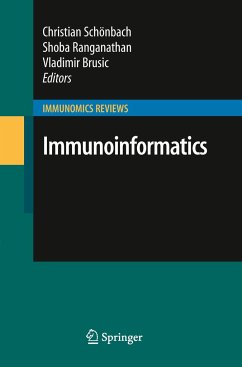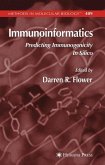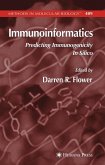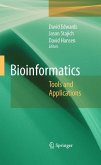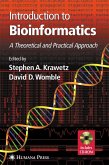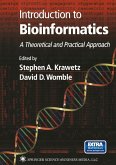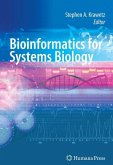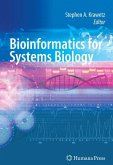Immunomics Reviews
An Official Publication of the International Immunomics Society
Series Editors: Vladimir Brusic, Dana-Farber Cancer Institute, Boston, Massachusetts
Andras Falus, Semmelweis University, Budapest, Hungary
Editorial Board: Anne S. De Groot, Brown University, Providence, Rhode Island
Darren Flower, Edward Jenner Institute for Vaccine Research, Berkshire, UK
Christian Schonbach, Nanyang Technological University, Singapore
Shoba Ranganathan, Macquarie University, Australia
Marie-Paule Lefranc Universite Montpellier II, Montpellier, France
This peer-reviewed book series offers insight on immunology for 21st century. The technological revolution has borne advances in high-throughput instrumentation and information technology, initiating a renaissance for biomathematics, and biostatistics. Cross-fertilization between genomics and immunology has led to a new field called immunomics, transforming the way in which theoretical, clinical and applied immunology are practiced. Immunomics Reviews will cover integrative approaches and applications to the theory and practice of immunology and explore synergistic effects resulting from a combination of technological advances and the latest analytical tools with the traditional fields of basic and clinical immunology.
Volume 1:
Immunoinformatics
Edited by Christian Schönbach
Immunoinformatics is an emerging subdiscipline of bioinformatics. It utilizes mathematics, information science, computer engineering, genomics, proteomics and immunological methods to bridge immunology and informatics. Similar to bioionformatics which became a driving force in genome research, immunoinformatics enables data-driven research strategies and systems approaches that aim at understanding the networks regulating the immune system. Considering the breath of topic, Immunoinformatics was composed to provide a cross-section of researchranging fromdata integration, epitope predictions to systems level applications. In ten chapters experts in the field introduce and discuss research strategies for immunologists and bioinformaticians who wish to endeavour existing and new approaches to gain insight into the workings of the immune system.
An Official Publication of the International Immunomics Society
Series Editors: Vladimir Brusic, Dana-Farber Cancer Institute, Boston, Massachusetts
Andras Falus, Semmelweis University, Budapest, Hungary
Editorial Board: Anne S. De Groot, Brown University, Providence, Rhode Island
Darren Flower, Edward Jenner Institute for Vaccine Research, Berkshire, UK
Christian Schonbach, Nanyang Technological University, Singapore
Shoba Ranganathan, Macquarie University, Australia
Marie-Paule Lefranc Universite Montpellier II, Montpellier, France
This peer-reviewed book series offers insight on immunology for 21st century. The technological revolution has borne advances in high-throughput instrumentation and information technology, initiating a renaissance for biomathematics, and biostatistics. Cross-fertilization between genomics and immunology has led to a new field called immunomics, transforming the way in which theoretical, clinical and applied immunology are practiced. Immunomics Reviews will cover integrative approaches and applications to the theory and practice of immunology and explore synergistic effects resulting from a combination of technological advances and the latest analytical tools with the traditional fields of basic and clinical immunology.
Volume 1:
Immunoinformatics
Edited by Christian Schönbach
Immunoinformatics is an emerging subdiscipline of bioinformatics. It utilizes mathematics, information science, computer engineering, genomics, proteomics and immunological methods to bridge immunology and informatics. Similar to bioionformatics which became a driving force in genome research, immunoinformatics enables data-driven research strategies and systems approaches that aim at understanding the networks regulating the immune system. Considering the breath of topic, Immunoinformatics was composed to provide a cross-section of researchranging fromdata integration, epitope predictions to systems level applications. In ten chapters experts in the field introduce and discuss research strategies for immunologists and bioinformaticians who wish to endeavour existing and new approaches to gain insight into the workings of the immune system.

